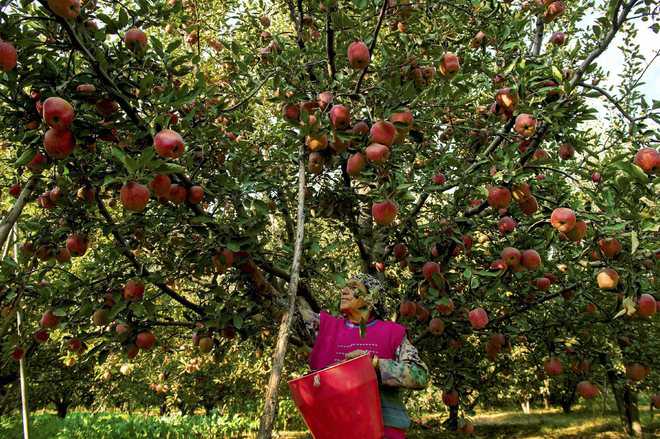Tasteless High-Density Apple Puts Shopian Orchardists in Distress

Muhammad Abbas is a freelance journalist based in Kashmir.
Apple farmers fear that high-density farming may imperil the apple industry in Kashmir.
Shopian — Orchardists in the southern Shopian district who had invested in high-density apple farming and were hoping for bumper returns are hopeless as the market rates for this variety have plunged to the lowest ever in recent years.
They lament that the high-density apple project, set up to transform apple production and revolutionize this industry is proving a hoax and may hurt the prospects of this industry forever.
According to government officials, Kashmir exports around 20 lakh metric tons of apple produce every year and the apple industry is expected to be worth around Rs 9000 crore including the employment it generates.
Speaking to Mountain Ink, Muhammad Amin Peer, President ‘Mega Fruit Mandi’ Shopian said that it is high time that Kashmir orchardists are made aware of the ramifications of high-density farming. “High-Density plants produce shiny and attractive apples but are insipid compared to other traditional varieties we have been growing here for decades.” A customer, he says, doesn’t buy these apples more than once. He alleged that the bureaucrats pushed people hard to avail the scheme for their own benefits.
Nazar ul Islam, an apple farmer who had planted over 500 High-Density apple trees in 2017, said that two years later the apples are tasteless and have no demand in the market.
Support Our Journalism
You are reading this because you value quality and serious journalism.
But, serious journalism needs serious support. We need readers like you to support us and pay for making quality and independent journalism more vibrant.
Nazar was tempted by the then PDP-BJP government’s promise of higher returns from High-Density Apple cultivation. Islam chopped down his full-grown orchard of local varieties of apple to plant the ‘High-Density Apple.’
Former J&K finance minister Haseeb Drabu had announced the establishment of High-Density Plantation Orchards and earmarked Rs 150 crore under the ‘Secure Horticulture Future’ initiative during the PDP-BJP rule in 2015. It envisaged raising average production from the current level of 10 MT/Ha to the international level of 40-70 MT/Ha.
Nazar pointed out another concern. He said that during winters, the branches of high-density trees, which are grafted on M9 rootstock, get easily damaged due to snow. “Given the smaller size of trees, there aren’t many means to support the branches which get dumped under snow,” he rues.
Tariq Rasool, a senior SKUAST scientist told Mountain Ink that the diversity in contemporary times is a must. “Once we grow more varieties which are harvested on different occasions of harvesting, it gives sufficient time to growers to pick, pack and sell the produce else they are trapped in the heavy burden of traditional varieties which ripen all at once,” he said.
There is a growing concern among the farmers over the high-density apple farming in Kashmir even as just one per cent of farmers have adopted high density. According to official data, more than 7 lakh families in Kashmir — around 35 per cent of the population — are directly or indirectly dependent on the fruit industry. In Kashmir, apple is grown on about 3.5 lakh hectares of land, of which only 8000 Kanals (400 hectares) of land has been converted to high-density which counts less than one per cent of Kashmir’s horticulture land.

“Fortunately we only have 43 diseases diagnosed in apples here, but at the same time, Iran has more than 400 diseases prevalent in apples. We have to check if (through imported rootstock) we are bringing more diseases to Kashmir. If yes, it could prove more lethal for our apple industry,” a SKUAST scientist said.
Muhammad Ashraf Wani, a renowned apple trader said that they are not against the change from traditional to high density. However, he said that research should be done in Kashmir and the new rootstock should be produced locally.
“Our apple is the best in the world. No apple variety in the world can compete with ours. We failed to promote our Delicious and Kulu Delicious but are spending hundreds of crores on European varieties which are proving to be a bane for our traditional apple industry,” he said. Wani claimed that most of the imported varieties are inferior in taste and nutrient composition, which is why it witnessed a huge setback in the market this year.
“Our produce of imported varieties remained unsold for weeks in Delhi market and when it was sold, it got 60 per cent lesser rates than previous years,” he said adding that Kashmir has a vast agricultural and horticulture university which should come forward to check if we are destroying our apple industry by planting unorganised high-density plants.

Director General Horticulture Kashmir, Ajaz Ahmad Bhat however said that a certain section of apple traders was spreading propaganda against the high-density plantation scheme.
He blamed the traders and said they bought premature fruit at a higher cost from growers and as a business strategy expected a better return for the ripened fruit. “If people do not get expected prices, they should store the produce and wait for better market rates,” he suggested.
Mountain Ink is now on Telegram. Subscribe here.
Become Our Ally
To help us strengthen the tradition of quality reading and writing, we need allies like YOU. Subscribe to us.
Muhammad Abbas is a freelance journalist based in Kashmir.










